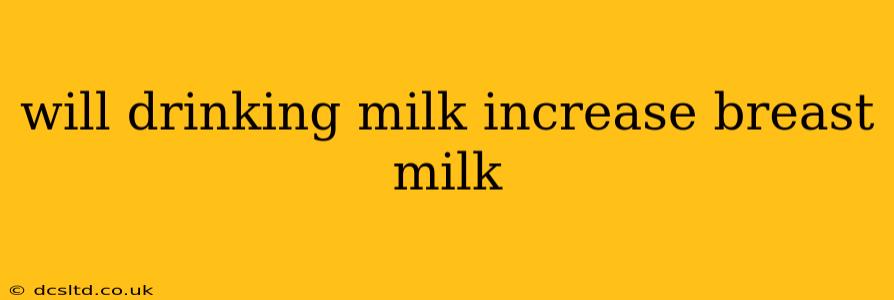The question of whether drinking milk increases breast milk supply is a common one among new mothers. While the idea seems intuitive – consuming milk to produce milk – the reality is more nuanced. Let's delve into the science and explore the factors that truly influence breast milk production.
Does Drinking More Milk Directly Increase Breast Milk?
The short answer is: not directly. While anecdotal evidence and old wives' tales abound, there's no scientific consensus supporting the idea that increased milk consumption directly boosts breast milk production. Your body's breast milk production is a complex process regulated by hormones, not simply by the amount of dairy you consume.
What Factors Actually Influence Breast Milk Supply?
Several key factors contribute to your breast milk supply:
-
Demand and Supply: This is arguably the most significant factor. The more frequently your baby nurses (or you express milk), the more your body produces. This is because the act of breastfeeding stimulates the release of prolactin, the hormone responsible for milk production.
-
Hormonal Balance: Proper hormonal function is crucial. Prolactin, as mentioned above, is key, but other hormones also play a role. Any hormonal imbalances can impact your milk supply.
-
Nutrition: While milk consumption doesn't directly increase breast milk, a healthy and balanced diet rich in various nutrients is essential for supporting milk production. This includes adequate calories, protein, fluids, and essential vitamins and minerals.
-
Hydration: Staying well-hydrated is crucial. Dehydration can reduce milk production. Aim to drink plenty of water throughout the day.
-
Stress Levels: High stress levels can negatively impact milk production. Finding ways to manage stress is important for maintaining a healthy supply.
-
Medication and Illness: Certain medications and illnesses can influence breast milk supply. It's important to discuss any concerns with your doctor or lactation consultant.
What About Calcium Intake and Breastfeeding?
While drinking milk won't directly increase milk supply, it's a good source of calcium, which is essential for both you and your baby. Breastfeeding mothers require adequate calcium intake to support bone health and milk production. However, calcium can be obtained from various sources like leafy green vegetables, fortified foods, and other dairy products.
Can Drinking Milk Help With Lactation in Other Ways?
While drinking milk itself may not boost breast milk production, it can be part of a healthy diet supporting overall wellbeing during breastfeeding. A balanced diet contributes to overall health and indirectly supports breast milk production by providing the necessary nutrients.
Other Frequently Asked Questions:
How much milk should I drink while breastfeeding?
There's no specific amount of milk you must drink while breastfeeding. Focus on consuming a balanced diet with enough calcium and other nutrients.
What if I'm lactose intolerant? Can I still breastfeed?
Yes! Lactose intolerance doesn't affect your ability to produce breast milk. If you're lactose intolerant, you can explore lactose-free dairy alternatives or other calcium-rich foods.
My milk supply is low. What should I do?
If you're concerned about your milk supply, consult a lactation consultant or your doctor. They can assess your situation and provide personalized advice and support. They can rule out any underlying medical conditions and help you identify strategies to boost your supply.
Remember, breastfeeding is a journey, and support is key. Don't hesitate to reach out to healthcare professionals for guidance and assistance if you have concerns about your milk supply.
